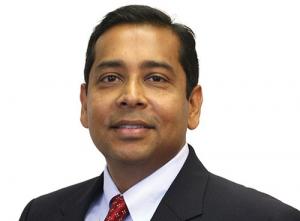Senior Vice President
Dr. Arshad Mansoor is Senior Vice President at the Electric Power Research Institute.
Steve Mitnick is Editor-in-Chief of Public Utilities Fortnightly and author of the book “Lines Down: How We Pay, Use, Value Grid Electricity Amid the Storm.”
EPRI Senior Vice President Dr. Arshad Mansoor talks about the potential of efficient electrification.

PUF's Steve Mitnick: What is efficient electrification and why is it needed?
Arshad Mansoor: Efficient electrification is the use of more efficient electric systems to reduce emissions, improve productivity, reduce water consumption, enhance grid flexibility and improve worker health and safety.
Compare 1990 to today: the air quality emissions related to every kilowatt hour of electricity is eighty-five percent down. Less NOX, SOX, mercury.
If I look at carbon emissions, I find that from 2000 to 2017, we are almost twenty percent lower in the U.S., primarily due to the market dynamics of gas, wind, and solar.
Then I look at electricity productivity. How much work we can get from each unit of electricity used. From 2000 to 2017, electricity productivity has increased more than fifty percent.
But electricity, the energy form that has shown that level of improvement in reducing emissions, enhancing productivity, is still only twenty percent of our overall energy mix. We have the opportunity to provide customers and society the choice to increase that number to forty, even fifty percent.
PUF's Steve Mitnick: It's not just technology; public policies are also important.
Arshad Mansoor: Yes. A good example is energy efficiency. Energy efficiency has meant tremendous benefits for customers. The industry has led that push.
But energy efficiency in most states is not fuel neutral. That's where policy comes in. It means if I'm in New York or California, I can only do energy efficiency projects or technologies in the electricity sector, or only in the gas sector, or only in the petroleum sector. There is a policy gap: we must make energy efficiency fuel-neutral. Energy efficiency means how efficiently you use all forms of energy. It's not how efficiently you use electricity.
PUF's Steve Mitnick: What's great about a future in which forty percent of the work in America is done by electricity?
Arshad Mansoor: Less emissions. Enhanced productivity. Less waste use. Improved worker health and safety. Less energy use. Enhanced affordability and grid flexibility. That and more is what could be great if customers and society choose to increase the adoption of efficient electric systems based on a clear understanding of benefit and cost. That is what our research is doing. Provide solid science and data to understand the benefit and cost of today's efficient electric technologies and tomorrow's.
Reducing emissions is the goal for many companies like Apple, Amazon, Google etc. You can't be building data centers and powering up with renewables if you've got a diesel forklift truck inside your warehouse. Those are the clear choices customers will need to make to achieve their goals - whether it is productivity or emissions, energy or water use, or any combination thereof. It's great to have a clear choice.
PUF's Steve Mitnick: The biggest conference since the 1893 World's Fair, is the EPRI Long Beach conference next August on efficient electrification. What's great about that conference?
Arshad Mansoor: The 1893 World's Fair in Chicago was the dawn of electricity with electric lighting. Electrification 2018 will be the next step, where we bring in all the stakeholders - customers, technology providers, policy makers and regulators and energy companies - so that they can make a clear choice on accelerated adoption of efficient electric technologies that could lead to a future where half of the energy use in the country and the world is cleaner electricity.


